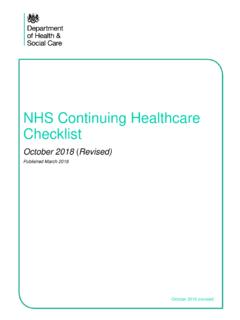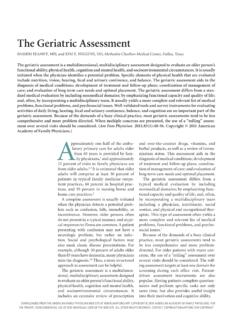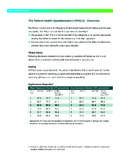Transcription of NHS Continuing Healthcare Decision Support Tool
1 October 2018 (revised) NHS Continuing Healthcare Decision Support tool October 2018 (Revised) Published March 2018 2 DH ID box Title: NHS Continuing Healthcare Decision Support tool Author: SCLGCP-SCP 25370 Document Purpose: Guidance Publication date: 1 March 2018 Target audience: Health and social care professionals Public Contact details: NHS Continuing Healthcare and NHS-funded Nursing Care team Department of Health and Social Care 39 Victoria Street London SW1H 0EU You may re-use the text of this document (not including logos) free of charge in any format or medium, under the terms of the Open Government Licence.
2 To view this licence, visit Crown copyright 2016 Published to , in PDF format only. 3 What is the Decision Support tool (DST)? 1. The DST is a national tool which has been developed to Support practitioners in the application of the National Framework for NHS Continuing Healthcare and NHS-Funded Nursing Care 2018 (the National Framework). The tool is a way of bringing together information from the assessment of needs and applying evidence in a single practical format to facilitate consistent evidence-based recommendations and Decision making regarding eligibility for NHS Continuing Healthcare .
3 All staff who use the DST should be familiar with the principles of the National Framework and have received appropriate training. When should the DST be used? 2. The DST should be completed by a multidisciplinary team, following a comprehensive assessment and evaluation of an individual s health and social care needs. Where an assessment of needs has been recently completed, this may be used, but care should be taken to ensure that this remains an accurate reflection of current need. 3. The comprehensive assessment of needs should be in a format such that it can also be used to assist Clinical Commissioning Groups (CCGs) and local authorities to meet care needs regardless of whether the individual is found eligible for NHS Continuing Healthcare .
4 4. The assessment of needs should be carried out in accordance with other relevant existing guidance, making use of specialist and any other existing assessments as appropriate. The DST is not an assessment of needs in itself. 5. The assessment of needs that informs completion of the DST should be carried out with the knowledge and consent of the individual, and the individual should be given a full opportunity to participate. The individual should be given the opportunity to be supported or represented by a carer, family member, friend or advocate if they so wish. The eligibility assessment process should draw on those who have direct knowledge of the individual and their needs.
5 6. An individual will be eligible for NHS Continuing Healthcare where it is identified that they have a primary health need . The Decision as to whether an individual has a primary health need takes into account the legal limits of local authority provision. Using the DST correctly should ensure that all needs and circumstances that might affect an individual s eligibility are taken into account in making this Decision . Primary health need is explained in paragraphs 54-66 the National Framework. 7. Completion of the tool should be carried out in a manner that is compatible with wider legislation and national policies where appropriate.
6 Note: Whilst this document is intended to be as clear and accessible as possible, the nature of the NHS Continuing Healthcare process is such that some words used may not be immediately understandable to someone who is not professionally trained. As far as is possible, professionals completing the DST should make sure that individuals, and carers or representatives (where consent is given), understand and agree to what has been written. In some situations advocacy Support may be needed. The national tools are available electronically (as Word documents) and pages or text boxes can be expanded as necessary.
7 4 How should consent be approached with the DST? 8. Where the individual concerned has capacity , their informed consent should be obtained before completion of the Decision Support tool (if consent has not already been obtained when the Checklist was completed). This consent needs to cover both the completion of the tool and the sharing of relevant information between the professionals involved. Please see paragraphs 72-73 of National Framework which gives detailed guidance on what is required for consent to be valid. 9. If there is a concern that the individual may not have capacity to give consent to the assessment process or to the sharing of information, this should be determined in accordance with the mental capacity Act 2005 and the associated code of practice.
8 It may be necessary for best interest s decisions to be made, bearing in mind the expectation that all who are potentially eligible for NHS Continuing Healthcare should have the opportunity to be considered for eligibility. Guidance on the application of the mental capacity Act in such situations is provided in paragraphs 74-81 of the National Framework. 10. The fact that an individual may have significant difficulties in expressing their views does not of itself mean that they lack capacity to make a Decision . Appropriate Support and adjustments should be made available in compliance with the mental capacity Act and with equalities legislation.
9 11. Robust data-sharing protocols, both within an organisation and between organisations, will help to ensure that confidentiality is respected but that all necessary information is available to complete the DST. The duty to share information (for the purposes of providing an individual with health or adult social care) as set out in Section 251B of the Health and Social Care Act 2012 applies equally to assessments for NHS Continuing Healthcare as it does to other health and/or care and Support assessments. Who can complete the DST? The Multidisciplinary Team (MDT) 12. In accordance with regulations an MDT in this context means a team consisting of at least: two professionals who are from different Healthcare professions, or one professional who is from a Healthcare profession and one person who is responsible for assessing persons who may have needs for care and Support under part 1 of the Care Act 2014.
10 13. Whilst as a minimum requirement an MDT can comprise two professionals from different Healthcare professions, the MDT should usually include both health and social care professionals, who are knowledgeable about the individual s health and social care needs and, where possible, have recently been involved in the assessment , treatment or care of the individual. CCGs may use a number of approaches ( face-to-face, video/tele conferencing etc.) to arranging these MDT assessments in order to ensure active participation of all members as far as possible NHS Continuing Healthcare Decision Support tool 5 What is the role of the individual/representative in the assessment of eligibility process?






